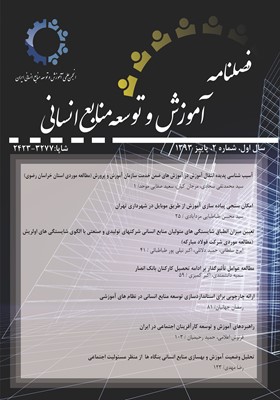راهبردهاي آموزش و توسعه کارآفرينان اجتماعي در ايران
محورهای موضوعی :فرنوش اعلامی 1 * , حمید رحیمیان 2
1 - دانشگاه علامه طباطبایی تهران
2 - دانشگاه علامه طباطبایی تهران
کلید واژه: راهبردها آموزش و توسعه کارآفرينان اجتماعي,
چکیده مقاله :
هدف اين پژوهش ارائه راهبردهايي به منظور آموزش و توسعه کارآفرينان اجتماعي در ايران ميباشدکه به روش آميخته انجام گرفته است. در بخش کيفي با 12 کارآفرين اجتماعي که به روش هدفمند انتخاب شدند، مصاحبه عميق انجام گرفت و اشباع نظري حاصل گرديد و سپس به روش نظريه برخاسته از دادهها و روش روايتي مورد تجزيه و تحليل قرار گرفتند. کارآفرينان اجتماعي عواملي چون فرهنگسازي و آگاهي بخشي عمومي، مطالعات تطبيقي و الگوبرداري، راهبري اثربخشتر نهادهاي سياسي و اجتماعي، توسعه فعاليتهاي مرتبط با آموزش کارآفرينان اجتماعي و نهادينهسازي کارآفريني اجتماعي در نظام آموزشي را مؤثر در آموزش و توسعه کارآفرينان اجتماعي در ايران بيان ميکنند. در بخش کمي پژوهش به منظور تأييد نتايج حاصل از بخش کيفي و تعميم پذيري داده ها، 5 فرضيه تدوين و سؤالات پرسشنامه بر اساس آن تنظيم گرديد. نمونه آماري بخش کمي پژوهش 58 نفر از بنيانگذاران و مديرعاملان موسسات خيريه در استان تهران بودند که به روش نمونهگيري دردسترس انتخاب شدند. سپس به روش آزمونt تک نمونه و آزمون فريدمن دادهها مورد تجزيه و تحليل قرار گرفت و همه مؤلفهها تأييد و تنها دو زيرمؤلفه مورد تأييد قرار نگرفت
The purpose of this study is to present strategies for training and development of social entrepreneurs in Iran. A mixed method study was conducted in two phases: qualitative and quantitative. In the qualitative phase twelve social entrepreneurs were interviewed in-depth. The interviews were conducted based on the theatrical saturation and purposeful sampling. Then “Grounded Theory” and “Narrative Method” used for analysis. Five general categories of factors were identified as a result of qualitative phase in order to expand training and development of social entrepreneurs: public awareness and culture building, comparing study and benchmarking, more effective strategies of political and social institutions, developing entrepreneurs’ activities with training of social entrepreneurs, and initializing entrepreneurship in educational systems. In quantitative phase, 5 hypotheses were formulated based on obtained qualitative results in order to verify and generalize them. The sample size for quantitative phase of this study contains 58 CEOs or founders of NGOs using convenience sampling method. Then the data were analyzed using one sample t-test and Friedman. All components were verified except two sub-components.

